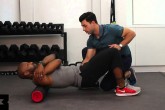
Unfortunately, you can’t believe everything you hear—or read. And that’s especially important to note when we’re talking about information concerning your health. Case in point: there’s been a laundry list of myths circulating about physical therapy over the past several years. And just like urban legends, these myths don’t hold up to the light of day. In fact, the American Physical Therapy Association (APTA) has debunked them all. Here’s what they found about our five favorite pieces of PT fiction:
Fiction 1: It’s going to hurt so bad.
Fact: The process of recovering from an injury or improving physical fitness and mobility can come with some pain. However, it’s a PT’s job to minimize that discomfort and work within each individual patient’s pain threshold. According to the APTA, 71% of people who had never experienced physical therapy assumed PT was painful. But that number dropped significantly for patients who had actually worked with a PT. Who are you going to believe?
Fiction 2: Physical therapy only works for injuries and accidents.
Fact: Physical therapy actually works for a whole range of conditions and symptoms. Because physical therapists are musculoskeletal experts, they excel at “evaluating and diagnosing potential problems before they lead to more serious injuries or disabling conditions—from carpal tunnel syndrome and frozen shoulder, to chronic headaches and lower back pain, to name a few” (APTA). PTs also work with strong, physically healthy athletes to improve physical fitness and athletic performance.
Fiction 3: I don’t need to see a physical therapist to receive physical therapy.
Fact: Despite what the IcyHot commercial says, nothing is a substitute for the skills and expertise of a trained physical therapist. Not even a chiropractor, masseuse, or general practitioner can provide the specialized treatment PTs are trained to deliver. The results of receiving “therapy” from someone who isn’t licensed to perform it—or trying to do it on your own—can run the gamut from making no improvement to exacerbating the condition or symptom. According to the APTA, “Your participation is key to a successful treatment plan, but every patient still needs the expert care and guidance of a licensed physical therapist. Your therapist will leverage his or her specialized education, clinical expertise, and the latest available evidence to evaluate your needs and make a diagnosis before creating an individualized plan of care.”
Fiction 4: I need a referral to see a PT, and even if I get one, it’s probably not covered by my insurance.
Fact: In a recent survey performed by the APTA, 70% of participants believed that a referral or prescription was necessary before they could even meet with a physical therapist. Luckily, that’s definitely fiction, because all 50 states—plus Washington, DC and the US Virgin Islands—allow patients to be evaluated by a physical therapist and receive some form of treatment without a referral. To learn about the rules in your state, check out this APTA direct access summary chart.
As far as insurance goes, most policies cover physical therapy. And in terms of overall cost savings, the APTA notes that “physical therapy has proven to reduce costs by helping people avoid unnecessary imaging scans, surgery, or prescription drugs. Physical therapy can also lower costs by helping patients avoid falls or by addressing conditions before they become chronic.”
Fiction 5: Surgery is more effective than physical therapy.
Fact: While surgery is sometimes unavoidable for certain conditions or injuries, in many cases, rehab therapy is a viable alternative. In fact, the APTA reports that “physical therapy has been shown to be as effective as surgery in treating a wide range of conditions—from rotator cuff tears and degenerative disk disease, to meniscal tears and some forms of knee osteoarthritis.” With that in mind, it’s definitely worth considering physical therapy as an option before going under the knife.
There you have it: five physical therapy myths debunked. Have any of your own? Join the conversation below.


